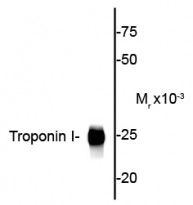ARG52452
anti-Cardiac Troponin I antibody
anti-Cardiac Troponin I antibody for Western blot and Mouse,Rat
Cell Biology and Cellular Response antibody; Controls and Markers antibody; Developmental Biology antibody; Signaling Transduction antibody
Overview
| Product Description | Rabbit Polyclonal antibody recognizes Cardiac Troponin I |
|---|---|
| Tested Reactivity | Ms, Rat |
| Tested Application | WB |
| Host | Rabbit |
| Clonality | Polyclonal |
| Isotype | IgG |
| Target Name | Cardiac Troponin I |
| Antigen Species | Mouse |
| Immunogen | Fusion protein of complete Mouse Cardiac Troponin I. |
| Conjugation | Un-conjugated |
| Alternate Names | RCM1; cTnI; Cardiac troponin I; TNNC1; CMD1FF; CMD2A; Troponin I, cardiac muscle; CMH7 |
Application Instructions
| Application Suggestion |
|
||||
|---|---|---|---|---|---|
| Application Note | WB: although higher dilutions can sometimes be used as cardiac troponin I expression is quite high in cardiac muscle. Specific for the ~25k cardiac troponin I protein. * The dilutions indicate recommended starting dilutions and the optimal dilutions or concentrations should be determined by the scientist. |
Properties
| Form | Liquid |
|---|---|
| Purification | Neat Serum |
| Buffer | Neat serum |
| Storage Instruction | For continuous use, store undiluted antibody at 2-8°C for up to a week. For long-term storage, aliquot and store at -20°C or below. Storage in frost free freezers is not recommended. Avoid repeated freeze/thaw cycles. Suggest spin the vial prior to opening. The antibody solution should be gently mixed before use. |
| Note | For laboratory research only, not for drug, diagnostic or other use. |
Bioinformation
| Database Links | |
|---|---|
| Gene Symbol | TNNI3 |
| Gene Full Name | troponin I, cardiac 3 |
| Background | Troponin I (cTnI) is 1 of 3 subunits, along with troponin C (TnC) and troponin T (TnT) of troponin complex found in cardiac muscle. cTnI binds to actin in thin myofilaments to hold the troponin-tropomyosin complex in place. Phosphorylation of cardiac isoform of TnI at serines 22,23 in the unique amino-terminal end molecule decreases the calcium sensitivity of the sarcomere, promotes calcium dissociation from troponin C and by extension enhances rates of cross-bridge cycling and diastolic relaxation (Noland, Jr. et al., 1995; Noland et al., 1989). In addition, studies using reconstituted fibers and mutational analysis have shown that PKC phosphorylation of TnI (largely at Ser43) inhibits the actin-cross bridge reaction and reduces the Ca++ dependent actomyosin ATPase rate as well as the calcium sensitivity of force generation (Noland, Jr. and Kuo, 1991). Phosphorylation at Thr144 (mediated by several PKC isoforms) reduces maximal tension development and cross-bridge cycling rates (Sumandea et al., 2008). Importantly, changes in the phosphorylation at each of these sites have been shown to be stage-specific with regard to cardiac disease progression (Walker et al., 2010). |
| Research Area | Cell Biology and Cellular Response antibody; Controls and Markers antibody; Developmental Biology antibody; Signaling Transduction antibody |
| Calculated MW | 24 kDa |
| PTM | Phosphorylated at Ser-42 and Ser-44 by PRKCE; phosphorylation increases myocardium contractile dysfunction (By similarity). Phosphorylated at Ser-23 and Ser-24 by PRKD1; phosphorylation reduces myofilament calcium sensitivity. Phosphorylated preferentially at Thr-31. Phosphorylation by STK4/MST1 alters its binding affinity to TNNC1 (cardiac Tn-C) and TNNT2 (cardiac Tn-T). |
Images (1) Click the Picture to Zoom In






